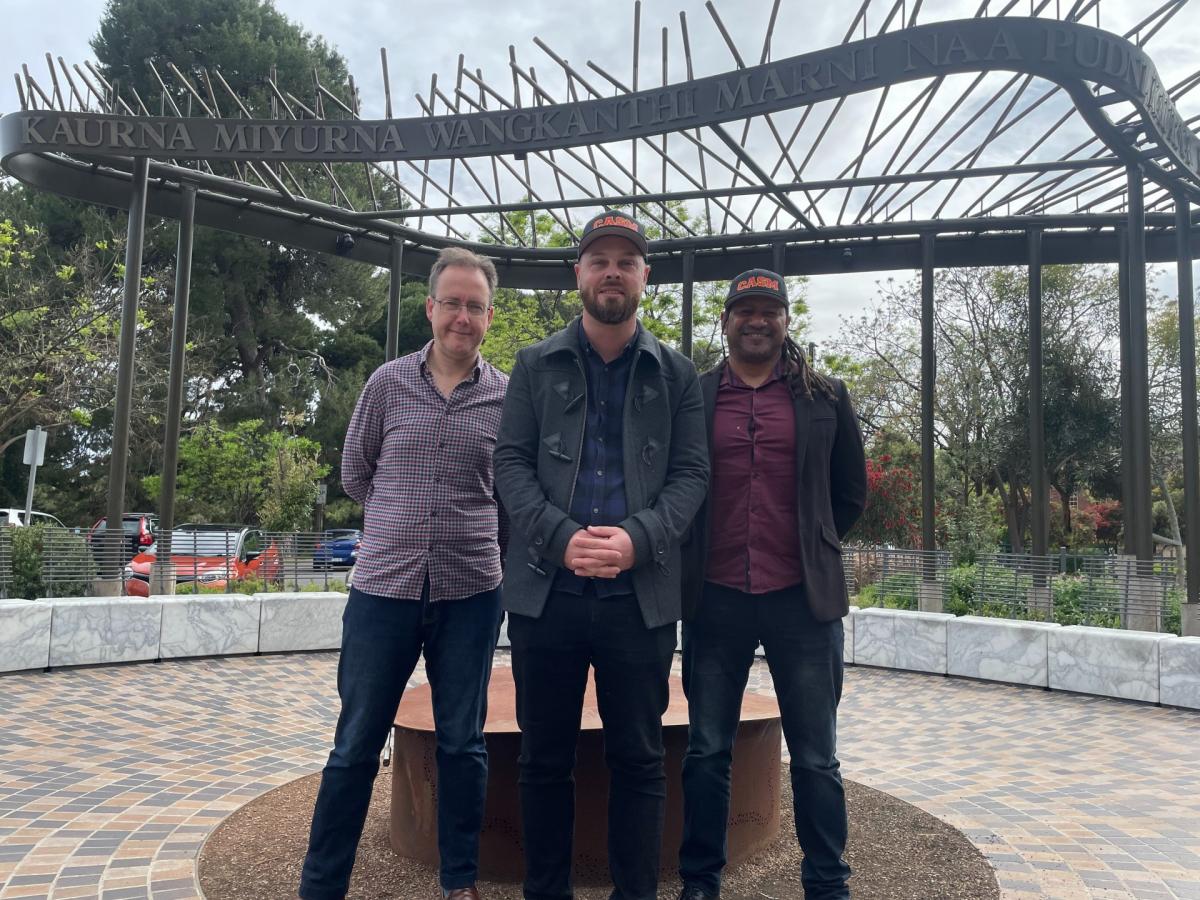
(From left) Dr Luke Dollman, Deputy Director at the Elder Conservatorium of Music, Dr Dylan Crismani, Lecturer at the Centre for Aboriginal Studies in Music, and Mr Grayson Rotumah, Co-ordinator at the Centre for Aboriginal Studies in Music, are involved in a project to study intricate tuning systems that underpin traditional Indigenous musical practices.
Researchers at the University of Adelaide have received a grant to focus on central Australian song lines. The project strengthens knowledge, understanding and application of the intricate tuning systems that underpin traditional Indigenous musical practices.
The team has received $1,032,900 over three years under the Australian Research Council’s Discovery Indigenous scheme.
“The project will develop a deep understanding of what Indigenous tuning systems are, how they are organised, and how they are and can be applied by Indigenous artists in collaboration with contemporary ensembles,” said the University of Adelaide’s Dr Dylan Crismani, Lecturer, Centre for Aboriginal Studies in Music (CASM).
“We will employ a unique methodology that combines Indigenous and contemporary Western musical performance practices with cutting-edge digital technologies.
“In so doing, will make the case for a more genuine, equitable dialogue between Indigenous and non-Indigenous music-makers, to the mutual benefit of musicians, audiences, and society at large.”
The project aims to revitalise dormant musical traditions in Arabana and Wangkangurru communities in both traditional and contemporary contexts.
A set of resources will be developed that will enable Arabana, Wangkangurru, and Titjikala musicians to integrate their musical cultural heritage into a contemporary setting.
“Ultimately, we are aiming to address the rapid loss of Indigenous culture,” Dr Crismani said.
“Through extensive field work the project seeks to revitalise music and language, restore and repatriate deteriorated cultural artefacts, and reconnect community members with their intangible cultural heritage.
“The project will yield significant musical outcomes which will be recorded and publicly disseminated by the ABC.
“The team will work closely with community members over the course of the project, and beyond, to ensure that the project goals and community goals are aligned.”
“Ultimately, we are aiming to address the rapid loss of Indigenous culture. Through extensive field work the project seeks to revitalise music and language, restore and repatriate deteriorated cultural artefacts, and reconnect community members with their intangible cultural heritage.”Dr Dylan Crismani, Lecturer at the Centre for Aboriginal Studies in Music, the University of Adelaide.
Professor Steve Larkin, Pro Vice-Chancellor, Indigenous Engagement, added: “This research project will be critically important in demonstrating how two distinct knowledge systems can contribute to new ways of thinking about contemporary cultural genres in a digital world.
“In this project, Indigenous and Western musical traditions become the foreground for generating dialogue between Indigenous and non-Indigenous music makers to explore how the combination of their respective musical traditions can inform new forms of musical performance practice while preserving the uniqueness and integrity of both traditions.
“It is both exciting and innovative and will undoubtedly make a significant contribution to the Australian music industry.”
Professor Anton Middelberg, Deputy Vice-Chancellor (Research), said: “This is an excellent example of the opportunities supported by the University for researchers to deliver impactful research outcomes, which will inspire future generations of Indigenous Australians to access and succeed in research and higher education.”
The research team also includes Professor Aaron Corn, Inaugural Director, Indigenous Knowledge Institute, the University of Melbourne; Dr Luke Dollman, Deputy Director, Elder Conservatorium of Music; Mr Grayson Rotumah, Co-ordinator, Centre for Aboriginal Studies in Music; Dr Gabriella Smart, Soundstream New Music; and Ms Eleanor McCall, Mobile Language Team.








